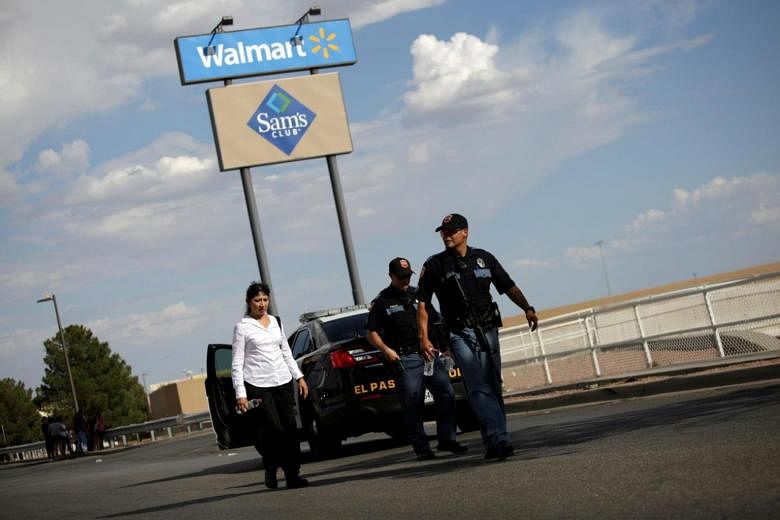EL PASO (Texas) • The recent gun violence at Walmart stores, with more than a dozen killed by a gunman in El Paso, Texas, last Saturday and two killed in Mississippi days before, has drawn attention to the company's complicated history with gun sales.
Firearms have long made up a key part of Walmart's business. In addition to being the world's largest retailer, Walmart is often referred to as the world's largest gun retailer.
Mr Sam Walton, founder of Walmart, was big on guns. An avid hunter, he opened his flagship store in Bentonville, Arkansas, specifically so he could be close to his in-laws' quail-hunting ranch.
But Walmart's relationship with firearm sales has been fickle in the 26 years since it made the landmark decision to stop carrying handguns. As economic and political winds have shifted, so have Walmart's gun policies, though the general trend has been towards more restrictions.
Last month, Walmart announced that it would stop selling guns in New Mexico after a new state law requiring background checks for almost all private gun sales went into effect. And last year, Walmart said it would raise the minimum age to buy a firearm or ammunition from 18 to 21 and remove products resembling assault-style rifles, such as airsoft guns and toys, from its inventory.
The company said in a statement that it made the decision "in light of recent events" - an inescapable reference to the then recent mass shooting at a Parkland, Florida, high school that left 17 people dead.
It was an unusual acknowledgement from Walmart, which has often attributed its changing positions on gun sales to market factors, even when other issues are present.
Walmart was late to the game in 1993 when it decided to stop selling handguns. Other major retailers such as Sears and J.C. Penney had pulled firearms from their shelves years earlier, as The New York Times reported at the time. That year, national rates of gun homicides and violent gun crimes reached record highs, according to Pew Research Centre.
Walmart's representatives said the company was ending handgun sales at its 2,000 stores because surveys showed people felt "uncomfortable" seeing pistols displayed alongside clothing and household items.
Another major move came in 2006, when Walmart announced that it would stop selling firearms entirely at all but a third of its US stores, which then numbered around 3,000. Again, the company said the decision was market-driven.
But when the economic recession took hold in 2009, Walmart's sales slumped. And after a five-year hiatus at most of its locations, the company started filling up shelves with shotguns, rifles and ammunition, as The Wall Street Journal reported in 2011.
Walmart chief executive Doug McMillon has stressed that he wants to cater to hunting and sports shooting, the things Mr Walton enjoyed.
That message came up again last year. In February 2018, two weeks after the mass shooting in Parkland, Walmart said in a statement that it had "taken an opportunity to review our policy on firearm sales".
"Our heritage as a company has always been in serving sportsmen and hunters," the statement read, "and we will continue to do so in a responsible way."
It is unclear whether the Walmart in El Paso sold firearms at the time of the shooting, or where the suspect obtained his rifle.
WASHINGTON POST

